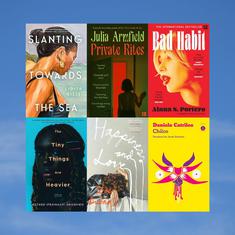“Children are feral,” remarks Barbara Covett (Judi Dench) to her colleague Bathsheba Hart (Cate Blanchett) in Richard Eyre’s Notes on A Scandal (2006). Covett is a senior history teacher, whose sobriquet among students is Poison Granny. Her listener is a charming new art teacher who is the cynosure of all eyes at a London comprehensive school. The film, which swerves in plot structure from Zoe Heller’s slim Man Booker shortlister of the same title, carefully retains the names of the protagonists.
Catholic custom has it that St Barbara is a protectress against fire and lightning, and Barbara, an almost pathologically narcissistic spinster, would fancy herself so perceived. Covett’s covert covetousness is almost palpable as she views the rungs of the social ladder with disgust, envy and awe. In voiceovers and excerpts from her diary, we hear Covett snarkily comment on students of the school in whom she sees “future plumbers, shop owners and terrorists too”. In another diary entry, she describes the “neurotic middle class” who can afford to do things differently in their “bourgeois bohemia”.
The other protagonist, Bathsheba or Sheba (“Were your parents thinking of the Bible or Hardy?”) is a “wispy novice” who crafts her own doom in a dalliance with Steven (the name means “honour” or “reward”), a 15-year-old student. Malevolently and poignantly, both the book and the film acknowledge Steven to be a “special needs” student. Steven manipulates the fecundity of his position with his gauche pursuit of Sheba. Predictably, after the exhilaration come his ennui and his exit. Children can indeed be feral.
No sane reader or viewer of Notes on a Scandal can condone Sheba’s reckless promiscuity with a teenager or her feckless defence of the desire to pursue it. But there is a disarming, dishevelled vulnerability that Blanchett brings to the somewhat “fey” character she plays. In one of the most riveting moments of the film, and in a manner most persuasive, she wistfully describes “the gap…life as you dream it and life as it is…”
Life as it is for Sheba, now in her early forties, is really not the worst by any standard. True, she has a child with Down syndrome and a teenage daughter who enjoys being difficult. But Sheba also has a dignified, elderly husband ( a donnish Bill Nighy), lives in a many roomed house and there are spades of love all around. However, the drab responsibilities of family drag Sheba down. Probably Sheba dreamt of forever being as punkish as her one time idol Siouxsie Sioux. Steven lets Sheba live that dream and feel as young as she would like to feel.
In her late sixties, and close to retirement, Barbara has only her diary and her cat for company. Her general disposition is not inviting and her acerbic tongue does not endear her to her colleagues. A repressed lesbian, Barbara clings to Sheba like a persistent barnacle but the real drama begins when, after worming her way into being Sheba’s confidante (moments of “the immediate, incautious intimacy” of the upper classes, as Barbara notes), Barbara becomes a possessive and terrifying blackmailer. In a performance that makes you cringe under its creepiness, Judi Dench has never been as solicitous a friend, as dangerous an enemy – or as consummate a thespian.
Predators all – Steven, Sheba and Barbara, but whereas Heller’s Barbara had only one other “conquest” – of a younger female colleague – director Richard Eyre’s Barbara is more a serial marauder. Thus, an engaging psychodrama of troubled lives unfolds. After tumultuous conundrums and betrayals in the story, the ultimate pat ending in the film allows the miscreants to cry and go home.
Heller does not offer such subterfuges in her book, which, despite its disturbing content, crackles with wry humour and wit. Cinematographer Chris Menges brings sheer radiance to Sheba and her surroundings while Barbara’s life is shot in almost cavernous colours. Eyre has an adroit and an irreplaceable cast, but Heller succeeds, better than Eyre in communicating the essence of her story which is to “attest to female friendships that might also include envy, rage, spleen, competition and unpleasantness.”









